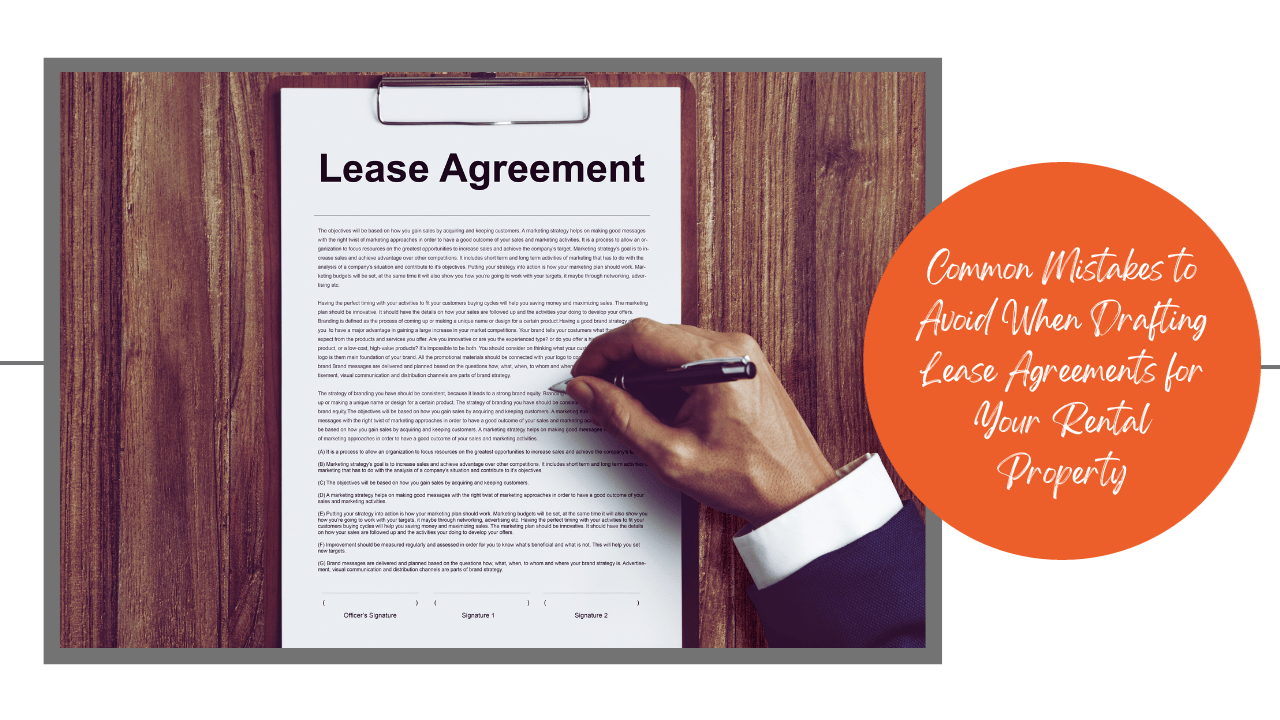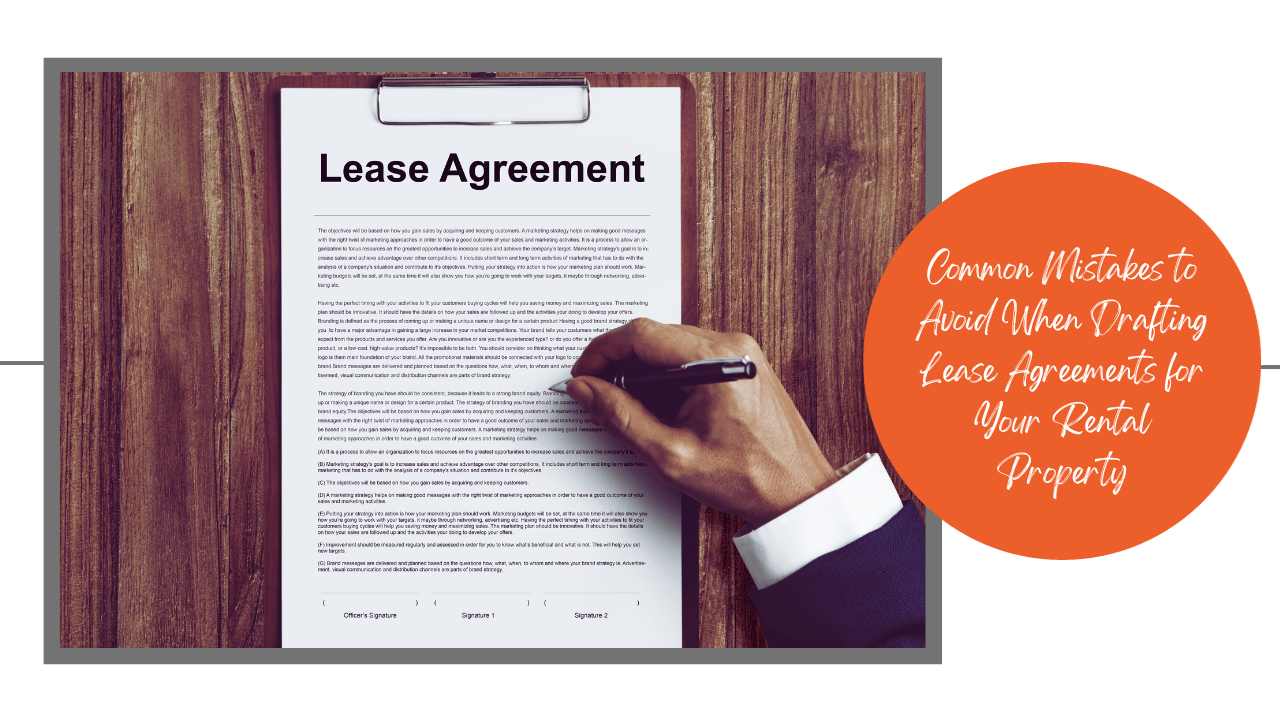
Now that you have a tenant approved and ready to move in, you’ll need to create a lease agreement. This can feel daunting to many landlords, especially if your legal experience is limited or you’ve never created your own lease before. You might take a look at what’s online and search for lease templates there. That’s a good starting point, but don’t download any sample lease you find on the internet. The lease you use must be consistent with the state and local laws.
A lease agreement is a legally binding contract between you and your tenant, and while most leases will generally have the same clauses and consistent information, each lease must be customized to the property, the region, and the owners and tenants who are signing it.
You’ll need a strong lease that’s comprehensive and clear.
There’s a lot of information on what should be included in a lease (we’ve shared this information ourselves). Today, we want to talk about the easy errors that are made when drafting a lease agreement. These are the common mistakes you want to avoid so that you can create a document that protects your interests and ensures a positive relationship with your tenant.
Using a Bad Lease Template
Who doesn’t love a free template?
As you’re looking online for information about how to create a lease agreement for your Atlanta rental property, you’ll likely come across a few sites that offer free lease templates.
It’s an attractive option, but not a great one. Downloading a lease that was written in Florida or Nevada will not help you with your rental property in Georgia. You might miss some important information in your lease and you could leave out some disclosures, information, or requirements that your Georgia lease must contain.
Instead of trolling the internet for a free lease, talk to an Atlanta property manager or a real estate attorney who specializes in rental homes. You can consult a professional organization that has a local presence.
If you find yourself in court for some reason, the first thing that the judge will ask to see is your lease agreement. It’s not a good idea to hand over a lease that doesn’t cover all of Georgia’s rental laws. You want to make sure it includes state-specific clauses and requires all the legal information that’s necessary to make your lease enforceable and compliant.
Not Being Clear on the Rent Payment Terms
One of the biggest mistakes that landlords make with their lease agreement is not being clear on the rent payment terms. You need a strong rent collection policy in order to effectively rent out a home, and that rent collection policy must be in writing and included in your lease.
Make sure your lease agreement reflects the rent that’s due, and make it detailed. An effective rent collection policy will say more than what the rental amount is. Include the following:
How much rent is due every month and the total amount that’s due over the 12-month lease term (or however many months the lease covers).
Whether there is a grace period for payment of the rent, and what that grace period is. State specifically the day on which rent is officially late.
How rent should be paid (check, online, etc.).
Consequences or penalties for late payments, such as late fees and eviction.
The lease agreement should reflect how much of a security deposit was collected and how it will be used. This is a good time to tell tenants what will be required in order to get their full security deposit refunded. When it’s in writing, they’ll be able to refer to those instructions before moving out.
Don’t leave this information out. If you find yourself needing to follow up on late rent or evict a tenant, you’ll need to establish with the court that you have a rent collection policy and that your tenants know what it is.
Neglecting to Include Landlord and Tenant Responsibilities
Show tenants what you expect. It’s a huge mistake not to include specific language around who is responsible for the landscaping and the pest control or the air filter changes and the repairs.
If you want to avoid disputes with tenants over repairs and property conditions, be clear about who is responsible for what in your lease. Maintaining a property is a partnership, and your residents need to see it as a joint responsibility. Put your expectations in writing, and there will be less confusion.
In addition to outlining the maintenance responsibilities, make sure you include instructions on how tenants should report maintenance to you. Do you want them to call with routine repair requests or put them in writing? Be specific.
Not Including All Necessary Information
A common mistake landlords make when drafting a lease agreement is not including all necessary information. Your lease agreement should include details like:
Guest policies
Smoking policies
Rules around making changes or alterations to the property
Parking
HOA rules and regulations
Leaving out any crucial information can result in confusion or disputes between you and your tenant, and could even lead to legal trouble. Be clear on what is permitted and what is disallowed.
Using Confusing or Ambiguous Language
Don’t make the mistake of leaving your lease agreement open to interpretation.
Your lease agreement should be written in clear and concise language that is easy to understand. You should not have to be a legal whiz to understand what the lease requires and provides. Make sure it’s readable.
Avoid using technical or legal jargon that may confuse or intimidate your tenant. Make sure that the terms are presented in a manner that is easy to read and follow. Remember to avoid ambiguity, as it can lead to disagreements between you and your tenant.
Having a professional review your lease before you sign it is highly recommended. Atlanta property managers can do this, or you can ask an attorney for help. Don’t just assume that the lease will make sense to your tenants.
When you meet with your residents to sign the lease - whether that’s in person or electronically - make sure they understand it. Ask them if the lease is clear. Answer any questions that they might have. It’s better to clear things up before they move in.
Being Unclear on Lease Renewal Terms
What happens at the end of the lease?
If the agreement does not state what happens, there may be some confusion when the last day of the lease term rolls around. Will your lease agreement convert automatically to a month to month situation? Or, will your tenants be asked to sign a new one-year lease agreement? What are the necessary steps to take if they want to leave? How much notice do they have to give?
Not being clear about the start date and end date as well as what happens after the lease is a huge mistake that can cause confusion and chaos.
When it’s time for the lease to renew or end, there needs to be a consistent procedure that tenants can easily reference in their lease. Generally, it’s 30 days or 60 days of notice that one party has to give.
Failing to Update your Atlanta Lease Agreement
 The final mistake to avoid when drafting a lease agreement is failing to update the document when necessary. If you’ve been renting to the same tenants for 10 years and you’ve never updated the lease, enforcing that lease agreement might be difficult.
The final mistake to avoid when drafting a lease agreement is failing to update the document when necessary. If you’ve been renting to the same tenants for 10 years and you’ve never updated the lease, enforcing that lease agreement might be difficult.
Over time, your property or your tenant's needs may change, and it is important to reflect these changes in the lease agreement. Failing to update the lease agreement can leave you vulnerable to legal trouble or disputes with your tenant. Make sure to set a regular review period, such as once a year or every time the lease is renewed, to ensure that the agreement remains current.
There are likely to be new laws passed that need to be reflected in the lease as it’s updated. You might have changed your policy on late fees and grace periods. Where has the security deposit been held all this time? Georgia state law requires landlords to place deposits in an escrow account in a state or federally regulated depository, and to give tenants the location of the account.
Make sure your lease is revised and refreshed as necessary; at least every time it’s renewed with your current tenants. Double-check to ensure that all of the necessary disclaimers are included, such as the lead paint disclosure and other state and federal requirements.
Drafting a lease agreement is an important part of being a landlord. By avoiding these common mistakes, you can create a contract that protects your Atlanta investment property and benefits both you and your tenant. Remember to be clear, concise, and comprehensive when drafting your agreement, and to update it as necessary.
Let’s avoid these mistakes and ensure your lease agreements are both legally enforceable and legally compliant. Contact us at Property Services of Atlanta.

 Owner Portal
Owner Portal




